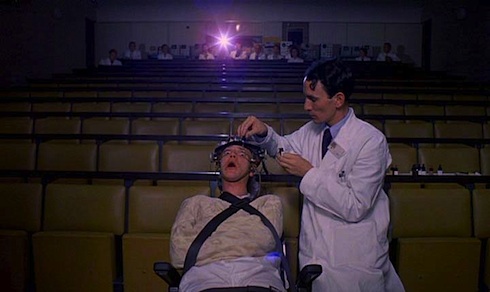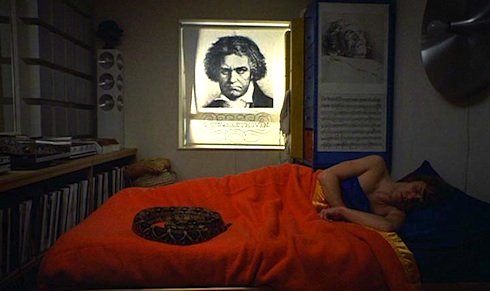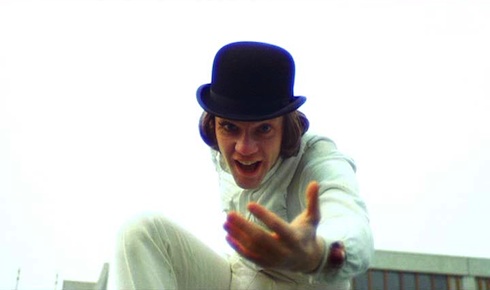Trying to write anything shorter than book length about A Clockwork Orange is a difficult task, because there’s so much to address, but I’ll give it a shot. Stanley Kubrick had originally intended to make a movie about Napoleon as his follow-up to 2001 until someone looked at how much it was going to cost (about twice the most expensive movie ever made to date) and pulled the plug. Still in the mood to make something, Kubrick turned to Anthony Burgess’ 1962 novel about youth run amok, free will, and totalitarianism, and the rest is history.
As critic John Simon pointed out at the time (before detouring into his trademark obsessive dwelling on the actors’ looks), A Clockwork Orange was a seemingly odd choice to film, being as it is a book very much about ideas and words; one of the book’s most fascinating elements is the slang spoken by protagonist Alex and other young people, which incorporates Russian, Cockney rhyming slang, and the odd Elizabethan flourish. The book’s narrative is clearly meant to be taken more literarily than literally, as Alex meets a series of characters both in his life as a criminal and when he’s been “reformed” by the totalitarian state; through what would be an unbelievable chain of coincidences if its purpose were not to highlight the philosophical discussion Burgess was conducting. And, since one of the book’s major themes was the way one’s perspective evolves with age, the book was divided into twenty-one chapters, three for each of the seven ages of man, mirrored by the seven chapters in each of the narrative’s three acts.
The differences between the book and the movie start with that very thing: the American edition of the book, which was the one Stanley Kubrick had read, omitted the final chapter, where Alex starts to feel like he’s outgrown his youthful fancies (if they can be so called), choosing instead to end with sardonic relish of the line “I was cured all right.” It’s a lot easier, without the final, sobering note casting a more regretful note over Alex’s past actions, to see him as a character who will stay “a clockwork orange” forever. (The title is a reference to the Cockney saying “as queer as a clockwork orange,” i.e. something that doesn’t rhyme with anything, like the word orange, and thus meshes poorly with the other gears in the clockworks that make up humanity.)
Kubrick’s take on the story, sans final chapter, feels more sensationalist than Burgess’, partly because Kubrick makes very little effort to blunt the edges of the sexual and violent (and violent sexual) content, and partly because ending the story where he does makes Alex more of an unrepentant anti-hero, and imbues him with a kind of satanic majesty that makes perfect sense of the fun fact that Kubrick originally toyed with the idea of casting Mick Jagger as Alex.
Malcolm McDowell, who ended up getting the role, turns in an iconic lead performance, managing to charm as a murderous rapist, even at his most horrible. McDowell conveys the charisma Alex would need to be the leader of a gang, the naivete necessary to not realize that the gang wouldn’t listen to him forever, and the intelligence to bide his time in prison after his gang ambushes him and leaves him to the mercy of the police. That charisma, naivete, and intelligence, to varying degrees and in no particular order, are what eventually lead Alex to become the test subject of an experimental aversion therapy technique the government is exploring to reduce out-of-control crime (which the first forty-five minutes of the movie depicts in exacting detail). If it went according to plan, the rest of the movie would be boring, and it most certainly isn’t, although the ever-present feeling of “Oh my God, what am I watching?” holds and deepens throughout the movie’s running time.

In A Clockwork Orange, Kubrick employs a darker and nastier version of the broad satire of Dr. Strangelove, complete with the extremely large, stagy performances—you could remove the dialogue in A Clockwork Orange and use silent movie intertitles and almost nothing would be lost—and stylized cinematography. One frequent visual cue Kubrick uses to evoke the dystopian, totalitarian state is Monumentalist architecture, in partcular Thamesmead Housing Project in South London in this scene (possibly NSFW for violence):
Also of note in that scene is another of Kubrick’s major devices in the movie: a deeply mischievous use of music, springing from Alex’s idiosyncratic (and atypical for the standard teen thug) love of Beethoven, the funniest instance being when the Minister of Interior is coming to the prison to recruit an inmate for the aversion therapy program, with great pomp and circumstance, to the tune of none other than “Pomp And Circumstance.” Even more than the book, the movie has the tendency to have the audience accidentally calling Beethoven “Ludwig Van” for years on end, and it’s absolutely hilarious in the best possible way to walk around talking about Beethoven like a metal singer.

However much I personally like A Clockwork Orange and think it’s an immaculately-made piece of cinema, I’m under no impression that its appeal is universal. The highly prevalent broadly comic tone glosses over some ugliness, especially in the way the movie (at best inadvertently) regards women and sexuality. While the movie never explicitly endorses Alex’s actions as good or right, one can hardly blame audiences, especially women, for being bothered by the fact that he never has to answer in any permanent way, for what he’s done.
That last is why discussions and arguments about A Clockwork Orange last so long. Its champions are right about it being an extremely well-made movie by a master filmmaker, its detractors are right about it being provocative at the expense of all else. Almost forty years after its release, A Clockwork Orange can still inspire heated arguments, and that alone is a testament to its power as a work of cinematic art. Love it or hate it, A Clockwork Orange is an extremely powerful movie, buzzing with life, never boring for a second.
Danny Bowes is a playwright, filmmaker and blogger. He is also a contributor to nytheatre.com and Premiere.com.










